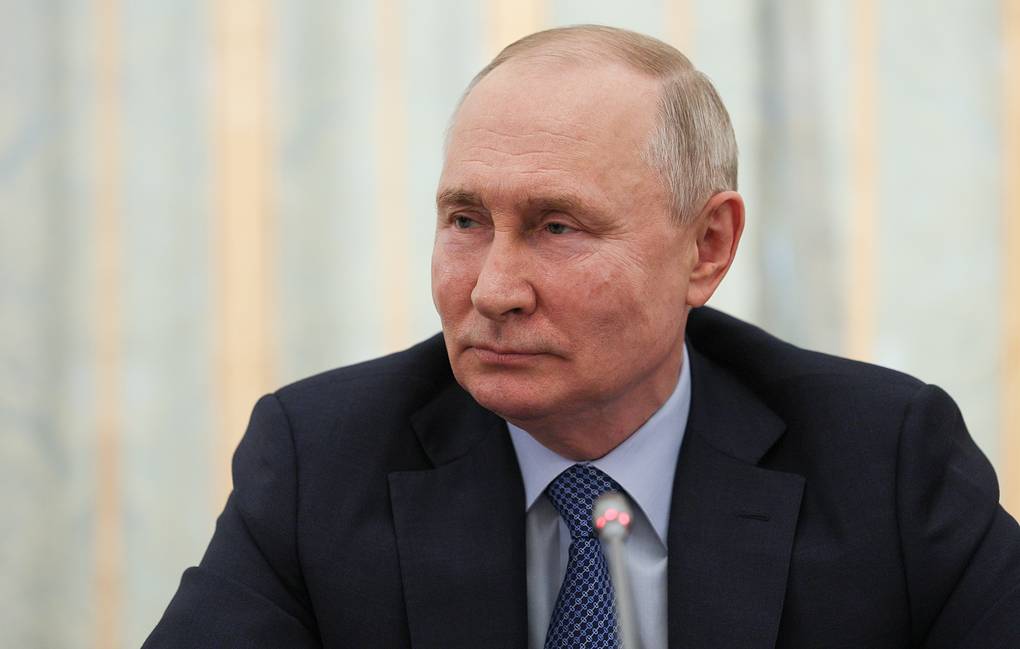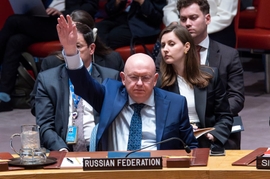President Vladimir Putin earlier this week said that Russia was considering withdrawing from the Black Sea grain deal brokered by Türkiye and the United Nations because the West did not keep its promises to get Russian agricultural goods to global markets.
In a meeting of Russian war correspondents and military bloggers, the president expressed his disappointment stating that the conditions set by the Western nations, under the leadership of the UN, had not been met.
“Unfortunately, we were once again cheated - nothing was done in terms of liberalizing the supply of our grain to foreign markets,” Interfax quoted President Putin as saying. “There were a lot of conditions that the Westerners had to fulfill under the leadership of the UN.”
The Kremlin has set forward a number of requests, including the reinstatement of the Russian Agricultural Bank into the SWIFT global payment system, the restart of farm equipment exports to Russia, and the removal of limitations on insurance and port access for Russian ships and cargo.
Additional demands made by Russia include the resumption of the Togliatti-Odesa ammonia pipeline, which enables the transportation of ammonia to Ukraine's main Black Sea port, and the unblocking of assets and accounts of Russian companies involved in food and fertilizer exports. Ammonia is a crucial component in fertilizer production, and Moscow insists that Ukraine allow its exports through the port of Odesa.
However, President Putin expressed that none of these requests have been honored, leading Russia to contemplate exiting the grain deal.
This decision could have far-reaching implications, as the Black Sea region, including Ukraine, serves as a vital hub for grain exports. Both Russia and Ukraine are major producers and exporters of grain, and any disruption to such exports would have significant economic and geopolitical consequences, potentially leading to a global food crisis.
The Black Sea grain deal between Russia and Ukraine is particularly critical for countries in the Middle East and North Africa region, which rely on Ukrainian wheat and corn imports. Ukraine and Russia are both significant food suppliers, accounting for 29 percent of wheat exports and 80 percent of sunflower exports globally. The exports are mainly through the Black Sea.
Ukraine, often referred to as one of the world's breadbaskets, is a top grain supplier to numerous developing nations. In 2021 alone, the country's grain exports reached $12.2 billion, accounting for nearly a fifth of its total exports.
Prior to the conflict, Ukraine exported 98 percent of its cereals and oilseeds through the Black Sea, averaging up to 6 million tonnes per month. However, due to blocked ports and an overwhelmed railway system, the country's monthly grain exports were reduced to a mere 1-1.5 million tonnes.







 President Ilham Aliyev shed light on the evolving contours of the peace process with Armenia during an international conference in Baku this week. ...
President Ilham Aliyev shed light on the evolving contours of the peace process with Armenia during an international conference in Baku this week. ...
 Azerbaijan and Armenia started the process of demarcation of their border on Tuesday, with the installation of the first border markers based on ge...
Azerbaijan and Armenia started the process of demarcation of their border on Tuesday, with the installation of the first border markers based on ge...
 Iran and Pakistan have signed eight cooperation documents in various fields, and agreed to strengthen ties to fight terrorism in the region.
Iran and Pakistan have signed eight cooperation documents in various fields, and agreed to strengthen ties to fight terrorism in the region.
 As the conflict between Ukraine and Russia escalates, the strategic importance of Kharkiv, Ukraine's second-largest city, has come sharply into focus.
As the conflict between Ukraine and Russia escalates, the strategic importance of Kharkiv, Ukraine's second-largest city, has come sharply into focus.
 Iranian President Ebrahim Raisi expressed Tehran’s readiness to participate in significant development projects in Sri Lanka during the inauguratio...
Iranian President Ebrahim Raisi expressed Tehran’s readiness to participate in significant development projects in Sri Lanka during the inauguratio...



